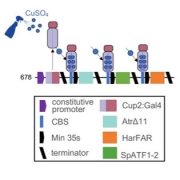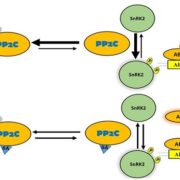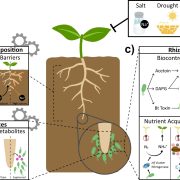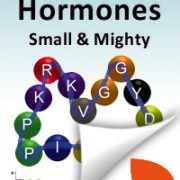Synthetic hormone-responsive transcription factors can monitor and re-program plant development (eLIFE)
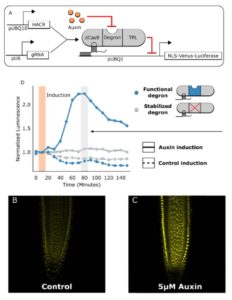 Khakhar et al. have developed a system by which genes can be made exquisitely responsive to specific hormones. They take advantage of the specificity of the guide DNA/Cas9 system, but use a deactivated (dCas9) enzyme that targets but does not cleave the target DNA. By fusing dCAS9 to a hormone-responsive degron (protein degradation domain) and a portion of the TOPLESS transcriptional repressor, they generated “hormone-activated Cas9-based repressors (HACRs, pronounced ‘hackers’).” The presence of the hormone (auxin, jasmonates or gibberellins) leads to degradation of the synthetic protein, enabling transcription. Using fluorescent proteins, they demonstrate patterns of endogenous protein accumulation, which correspond to data obtained through other methods. By targeting the HACR against genes encoding PIN1 auxin transporters, they are able to modulate plant development in predictable ways. (Summary by Mary Williams) eLIFE 10.7554/eLife.34702
Khakhar et al. have developed a system by which genes can be made exquisitely responsive to specific hormones. They take advantage of the specificity of the guide DNA/Cas9 system, but use a deactivated (dCas9) enzyme that targets but does not cleave the target DNA. By fusing dCAS9 to a hormone-responsive degron (protein degradation domain) and a portion of the TOPLESS transcriptional repressor, they generated “hormone-activated Cas9-based repressors (HACRs, pronounced ‘hackers’).” The presence of the hormone (auxin, jasmonates or gibberellins) leads to degradation of the synthetic protein, enabling transcription. Using fluorescent proteins, they demonstrate patterns of endogenous protein accumulation, which correspond to data obtained through other methods. By targeting the HACR against genes encoding PIN1 auxin transporters, they are able to modulate plant development in predictable ways. (Summary by Mary Williams) eLIFE 10.7554/eLife.34702


